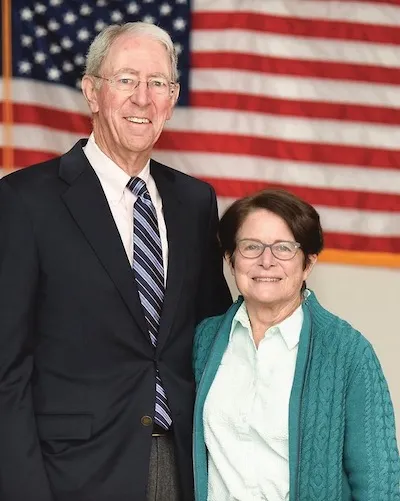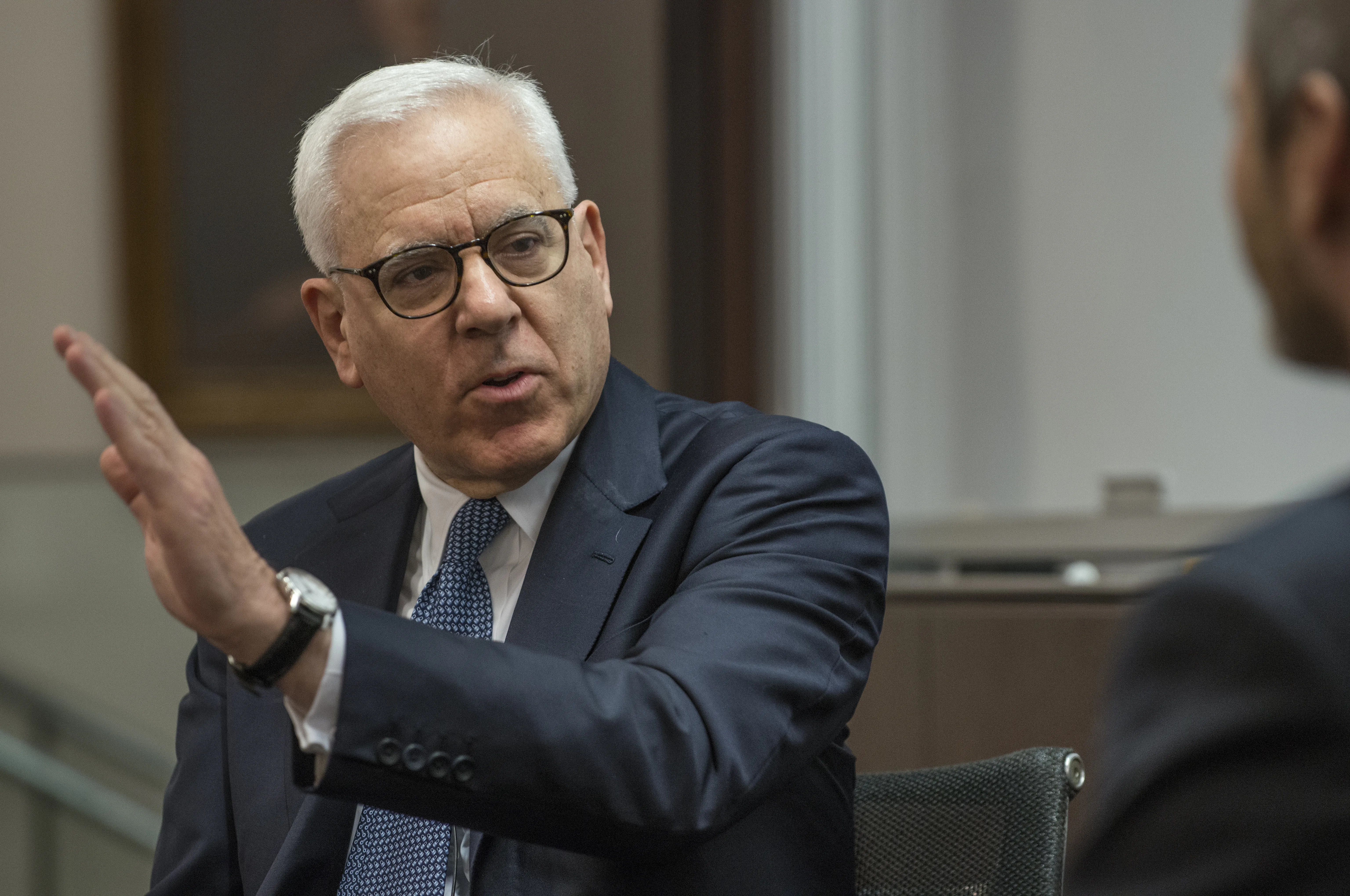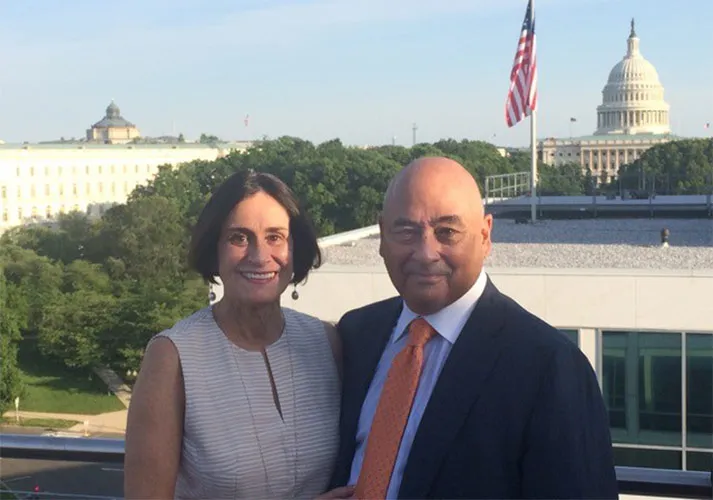David Rubenstein Makes $10 Million Gift for Student Scholarships
David M. Rubenstein has never forgotten the importance of the full-tuition scholarship he received to attend the University of Chicago Law School and the difference it made in his life.
Coming from a family of modest means, he graduated from the Law School in 1973 free of debt and free to pursue a nontraditional career path that made him one of the most successful and influential businessmen and philanthropists in the United States. Now Rubenstein is giving back in a way that will usher in a new era at the Law School by making a similar difference in the lives of 20 of the nation's brightest students each year.
Rubenstein has given the Law School the single largest gift it has ever received from an individual: $10 million. With this one extraordinarily generous act of philanthropy, Rubenstein's gift creates the most expansive scholarship program the Law School has ever offered. Beginning in 2011, the David M. Rubenstein Scholars Program will provide 60 entering students with full-tuition scholarships covering all three years of their studies (20 students per year for three successive classes-2014, 2015, and 2016).
Rubenstein is cofounder and managing director of The Carlyle Group, which as one of the world's largest private equity firms manages more than $90 billion from 19 worldwide offices. He says he expects that his gift will help redress the principal impediment facing the Law School in competing for top students: "Chicago is a great, great law school, but it is handicapped by an endowment that is small compared to the endowments of other top schools. I'm hoping that my gift-along with gifts that might be given by other graduates who are in a position to make them-will help persuade even more of the most talented students to come to Chicago."
Rubenstein understands from personal experience the influence that a generous scholarship can have. A magna cum laude, Phi Beta Kappa graduate of Duke University, he applied successfully to several law schools. It was the offer of a full-tuition scholarship that ultimately led him to choose Chicago. That National Honor Scholarship was particularly significant for him because of his family's modest financial circumstances-his father was a postal clerk whose annual wage never exceeded $10,000. "The scholarship meant that I could tell my parents that I wouldn't need any money from them for law school," he recalls. "That meant a lot to me."
Just two years after law school, he enjoyed another important benefit of his scholarship when he stepped away from practicing at the law firm Paul Weiss Rifkind Wharton & Garrison to pursue his interest in politics. Rubenstein became chief counsel to a U.S. Senate subcommittee headed by Indiana Senator Birch Bayh, who was considered a likely presidential contender. "I probably couldn't have pursued that opportunity if I had been burdened with debt," he says.
When Bayh's candidacy didn't work out, Rubenstein joined Jimmy Carter's successful presidential campaign along with Carter advisor Stuart Eizenstat. Carter made Eizenstat his domestic policy advisor, Eizenstat made Rubenstein his deputy, and at the age of 27 Rubenstein had a West Wing office. "The White House job didn't pay badly," Rubenstein recalls, "but I probably wouldn't have had it without the first step of going to work for Bayh, so I have my scholarship to thank for that, too."
Chicago's rigorous atmosphere apparently also prepared Rubenstein for the life of a White House staffer. A contemporaneous profile of Rubenstein reported that his working hours exceeded even those of the Commander-in-Chief, who had a well-earned reputation as a workaholic.
Turbocharging the Virtuous Cycle
Rubenstein's $10 million commitment to the Law School will affect every aspect of the school. According to Dean Michael Schill, "David's magnificent act of philanthropy is a game-changer." Attracting the best and the brightest students to Chicago with full-tuition scholarships will generate a virtuous cycle. Great faculty are attracted and retained in part by the presence of extraordinary students; and top students are attracted by the presence of great faculty. The more accomplished a school's faculty and students, the greater its reputation and ranking is likely to be, which means that more top students will be attracted to enroll. In addition, the more talented a student body is, the more rich are the conversations in and outside of class. Thus, although only 20 students or one-tenth of each admitted class will be named Rubenstein Scholars, the program will benefit the entire community in important ways.
Accelerating this cycle at Chicago is the primary reason why Rubenstein chose to make his gift an expendable one rather than a gift to the Law School's endowment. With an expendable gift, funds can be applied quickly, as the Law School perceives the need for them, rather than more slowly, as with an endowment. "Let's see the results right away," Rubenstein says. "If it works, you can expand it or extend it. If it doesn't, try something else. If the Law School gets the right bang for these bucks in a short time frame, it could make a very big difference very quickly."
Rubenstein says he believes that this is a moment when scholarships can have a particularly large impact. "Right now, some of the financial allure of practicing law has diminished. Salaries probably aren't going to keep rising as fast as they have, and so debt load becomes an increasingly important consideration, even for students from relatively well-off families. It's an excellent time for the Law School to get the attention of the students it really wants, the most talented ones, and make them a very attractive offer."
Rubenstein's own experience exemplifies many aspects of the virtuous cycle. "The Law School gave me so much, and I wanted to give back," he explains. "I never had a bad professor there, and many of them-Soia Mentschikoff and Walter Blum, to name just two-were exceptional. It was the best law faculty in the country. And my classmates were extraordinarily talented people-[federal Appeals Court judges] Frank Easterbrook and Doug Ginsburg come to mind. I think anyone fortunate to have the kind of experience I had would want, if their circumstances permitted it, to give something back."
"In some ways," he adds, "my time at the Law School helped edge me into government and eventually into business because it became clear to me that in contrast to the faculty and to many of my fellow students, I wasn't going to be a Richard Posner; I wasn't any kind of legal genius." (Rubenstein once told an interviewer that he knew he wasn't a great lawyer because when he was thinking of leaving Paul Weiss and when he later considered leaving Shaw Pittman (after a stint between his White House service and before founding The Carlyle Group), "none of my partners said 'Don't leave' and none of my clients said 'Don't leave.' So I concluded I must not be that great a lawyer.")
"A Modest Repayment"
When Rubenstein founded The Carlyle Group in 1987 with three others, his expectations were modest. "I didn't think we'd ever have more than ten employees, and the space we leased didn't have any room for expansion," he remembers. Today the firm has more than $90 billion under its management and employs more than 880 people in 19 countries. The companies within the Carlyle portfolio have more than $84 billion in revenue and employ more than 398,000 people around the world.
"I've been extremely lucky," he says. "Whatever I can give back will be only a modest repayment for my good fortune." In addition to financial gifts to a wide range of educational and other institutions, Rubenstein serves as a trustee of the University of Chicago, Duke, and Johns Hopkins and in major advisory capacities at Harvard and Princeton. He holds leadership and advisory positions at 24 other organizations, including service as chairman of the John F. Kennedy Center for the Performing Arts, president of the Economic Club of Washington, and a Regent of the Smithsonian Institution. Last month, Rubenstein was part of a group of 40 individuals who pledged to give half of their wealth to charity. The Law School honored Rubenstein at graduation in 2007 with its Distinguished Alumnus Award. Dean Schill observes, "David Rubenstein is the sort of person a dean dreams of being an alumnus of his or her school. David is a wise man, a good man. He is a leader in every realm he touches. We are all proud that this institution helped make him the man he is today."
Still traveling at least 250 days a year on business, Rubenstein comments, "I see people my age preparing for retirement, but I have a different view-I'm intending to sprint to the finish line, wherever that may be." To keep himself in sprinting shape, he maintains his longtime practice of not eating meat, not drinking, and not smoking. "I've told my kids," he says, "that after I die and an autopsy is done on me, I'd like them to let me know whether all that clean living was worth it."
"The Beginning of a New Era"
Dean Schill (whom Rubenstein praises for acting quickly and forcefully to build on the strong legacy created by his predecessor Saul Levmore) notes that when he and Rubenstein met, they quickly discovered that they had similar family backgrounds-they both were the among the first in their families to attain post-secondary degrees, and coming from families of modest means they both relied upon scholarship support to enable them to pursue higher education. "David's commitment to providing scholarships resonated strongly for me," Schill says. "Not only because it is so right for the Law School, but because he and I both understand at a personal level that scholarships can make all the difference in whether a student can attend a great school like Chicago."
Now, Schill observes, Rubenstein's gift has initiated "the beginning of a new era" at the Law School. "Not only will we have more resources to attract the very brightest students to the school, but David's leadership will inspire our other alumni to open their pockets to benefit the school that they also owe so much to."
Perhaps no one says it better than David Rubenstein, who invites other alumni and friends of the Law School to join in this "potentially transformative" moment: "I've made a down payment toward a future when the Law School may have financial assets comparable to those of its competitors, but there are still many places where new funding can create additional leverage. I hope my gift might incent others who are in a position to be helpful. I hope they'll keep in mind how much a Chicago education has meant to them, and see fit to give back to this great institution."


